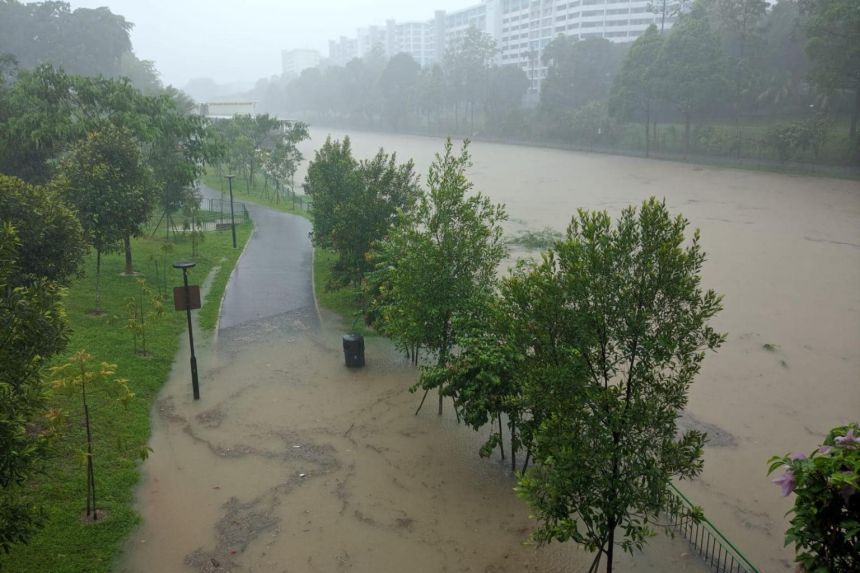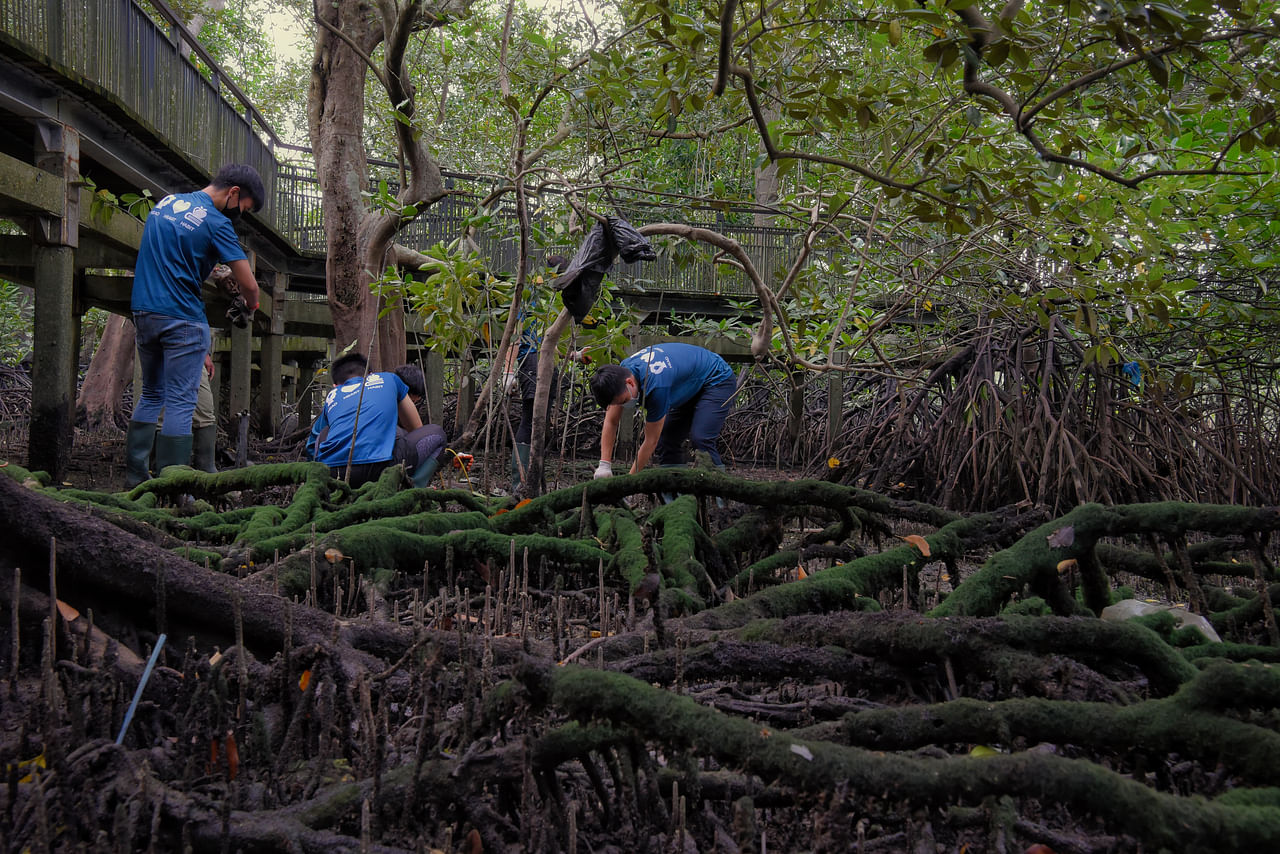S'pore must prepare for rising waters due to heavy rain, climbing sea levels, say experts
Sign up now: Get ST's newsletters delivered to your inbox

The PUB is working to tackle the flooding threat holistically. Heavy rains caused flash floods in Singapore on April 17, 2021.
PHOTO: AMAN AMARTH/FACEBOOK
Follow topic:
SINGAPORE - Climate change is causing the waters in and around Singapore to rise, and the flash floods last Saturday (April 17) are but one symptom of this.
Other than causing more frequent bouts of intense rainfall that could overwhelm drainage systems, climate change is also driving up sea levels - a threat for a low-lying country like Singapore, said experts during a webinar on sea-level rise organised by The Straits Times.
One of the three panellists, Ms Hazel Khoo, director for national water agency PUB's coastal protection department, noted that Singapore is a low-lying city, where about 30 per cent of the island is located less than 5m above mean sea level.
"The impact and damage (of sea-level rise) will definitely be devastating and that calls for action now," she said at the webinar held in conjunction with Earth Day on Thursday (April 22).
For its part, PUB is working to tackle the flooding threat holistically, by studying the twin effects of rising sea levels and more intense rainstorms on the country, Ms Khoo added.
Pointing to last Saturday's deluge, Ms Khoo said that western Singapore had over a few hours that day received more than 90 per cent of the average monthly rainfall for the entire month of April.
"This is something that we can expect more frequently," she said of the bout of intense rainfall.
PUB is now working with the National University of Singapore (NUS) and water management solutions provider Hydroinformatics Institute to develop a coastal-inland flood model.
The other two experts who took part in the webinar were sea-level rise expert Professor Benjamin Horton, director of the Earth Observatory of Singapore at the Nanyang Technological University (NTU), and Dr Zeng Yiwen, senior research fellow at the NUS Centre for Nature-Based Climate Solutions.
The webinar, which was held over Zoom but will also be available for viewing on ST's YouTube channel on Wednesday (April 21) evening, was moderated by ST climate change editor David Fogarty.
In 2019, a major United Nations report found that if the amount of planet-warming emissions remains high, sea-level rise in the centuries ahead could exceed rates of several centimetres per year, instead of the current increase measured in millimetres per year.
But Prof Horton noted that Singapore, like the rest of South-east Asia, is especially vulnerable to sea level rise. This is due to its low-lying nature, high population density, and geography as an island-state.
And even though the ice sheets in Greenland and Antarctica are located far from this region, their melting could have implications for this part of the world, said Prof Horton.
"People in Singapore think that what's happening in Greenland or Antarctica, which is 10,000km or so away, will remain in these high latitude locations. But it's quite simply not true," he said.
"The changes in Greenland, the Arctic and Antarctica influence the weather, they influence the climate and they will influence sea level here in Singapore."
Take Antarctica for instance, he said. It is 20,000 times the size of Singapore, and exerts a huge gravitation pull on the waters surrounding the ice sheet.
"If you lose that mass, the water flows away and you get a greater rise in sea level in regions that are distant from these ice sheets, such as the tropics," said Prof Horton.
He added that researchers at NTU's Earth Observatory of Singapore have run models that suggest that if the melting of the Antarctic ice sheet causes sea levels to rise by 1m, Singapore could face a 1.3m sea level rise - or around 30 per cent greater than the global average.
Sea level rise will also affect natural habitats in the region, said NUS' Dr Zeng.
South-east Asia is home to large swathes of natural habitats that also help in humanity's fight against climate change by sucking up lots of heat-trapping carbon dioxide through photosynthesis.
Mangroves, for example, stand where land meets sea, and are known for their ability to store about three times more carbon than dryland tropical rainforests. Because of their ability to trap sediment among their roots, they can keep pace with sea level rise to an extent, moving further inland when sea levels go up.
But rising sea levels could dilute their ability to do so.
"The problem arises when we develop areas behind the mangroves," Dr Zeng said. "When we develop the land areas, that serves as a barrier and that blocks all these habitats from moving further inland to adapt to the sea level rise."
Throw in the effects of storm surges or the changing hydrology of the area, and these habitats will be further threatened, he said.
Asian solutions for a global problem
Yet, Singapore is also poised to be a hub for climate change solutions for the region, the experts said.
One way it can contribute is on the research front.
Climate science in tropical regions is not as developed as it is in temperate regions.
But Singapore is working to change this with a whole slew of research initiatives, such as the National Sea Level Programme, which is coordinated by the National Environment Agency's (NEA) climate science research programme office, a unit under the Centre for Climate Research Singapore .
PUB's Ms Khoo said that the centre is positioned to be a regional centre.
"As we go in-depth into understanding climate science, especially tropical climate science, I think it will benefit the region to also understand how they would be affected by the threat of sea level rise," she said.
Prof Horton noted how researchers in Singapore are part of the Intergovernmental Panel on Climate Change - the United Nations' climate science panel.

Mangroves are known for their ability to store about three times more carbon than dryland tropical rainforests.
PHOTO: ST
He added: "We have to use all the great minds in the world, from developed and developing countries, to solve this problem of climate change, and Singapore is at the heart of this. Singapore has a very unique place. It's located in the tropics, it has the highest biodiversity in the marine and the terrestrial realm on its doorstep."
Prof Horton added: "Singapore can take the lead in understanding climate impacts in the tropics - highest biodiversity, highest population, but potentially the highest impacts from climate change."
NUS' Dr Zeng said Singapore was part of the regional community - which also includes forestry practioners, members of the local communities, government officials and non-government organisations - working on how to preserve forests in South-east Asia.
"Now we understand that nature has value, and this value goes towards mitigating climate change," he said. "There have been many projects within South-east Asia itself that have been tackling this problem, and I guess Singapore is part of that community to conserve nature and mitigate climate change."
The panellists
1. Professor Benjamin Horton, director of the Earth Observatory of Singapore at Nanyang Technological University
Prof Horton's research focuses on sea-level change. He aims to understand the mechanisms that have determined sea-level changes in the past, which will impact changes in the future. He is also an editor for the Intergovernmental Panel on Climate Change (IPCC) Sixth Assessment Report, with its synthesis report due for release next year. He has also published over 200 articles in peer-reviewed journals, including Science, Nature and Proceedings of the National Academy of Sciences.
2. Ms Hazel Khoo, director of the coastal protection department at national water agency PUB
Ms Khoo's department is driving and coordinating whole-of-government efforts to develop long-term strategies to protect Singapore from the threats of rising sea levels, and address both coastal and inland flood risks. One of her immediate key tasks is to oversee site-specific studies for City-East Coast and the northwestern coast of Singapore, to develop coastal adaptation pathways and measures. She has also headed the Western Catchment planning division in PUB's catchment and waterways department, which was responsible for the planning of drainage systems.
3. Dr Zeng Yiwen, senior research fellow at the NUS Centre for Nature-Based Climate Solutions
Dr Zeng is an applied ecologist, geospatial analyst and conservation scientist. His areas of expertise include biodiversity conservation, sustainable development and climate change mitigation. His work at the university is focused on identifying key strategies to implement nature-based climate solutions across various ecosystems. His research has been published in major journals such as Nature Climate Change and Nature Communications, the most recent being on green and blue carbon financing to protect tropical forest ecosystems and studies on the constraints on reforestation.
The webinar on Wednesday (April 21), was moderated by Mr David Fogarty, climate change editor and assistant foreign editor at The Straits Times.

